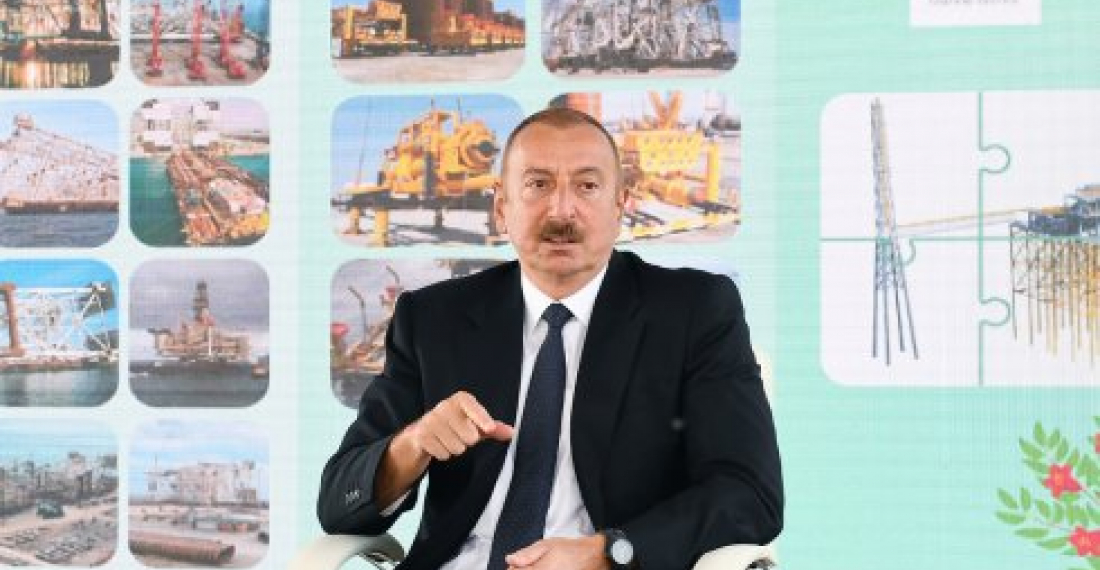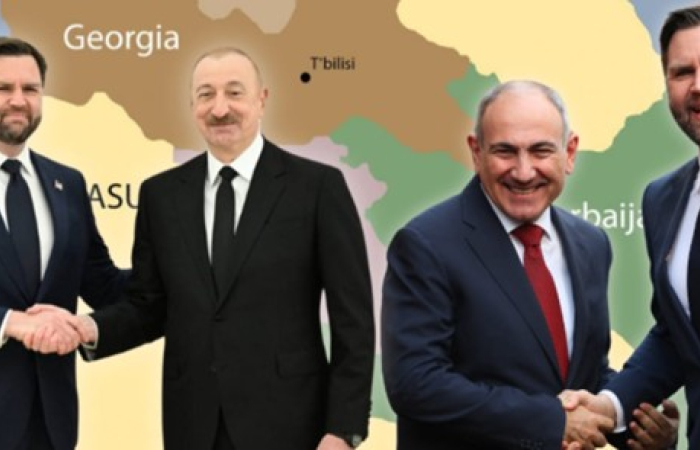The president of Azerbaijan, Ilham Aliyev, has said that negotiations with Armenia are currently non-existent, and accused the Armenian leader of disrupting the negotiations on the settlement of the Nagorno-Karabaklh conflict. Aliyev was speaking to journalists in an interview with the main Azerbaijani TV channels on Saturday (19 September).
In excerpts of the interview, carried by the official Azertac News Agency, president Aliyev gave a negative assessment of the negotiations process.
"Negotiations are virtually non-existent. I have said before that we will not participate in negotiations for the sake of their imitation. This does not mean that we are refusing to negotiate. It means that we do not want to join Armenia's cunning policy. Our participation in an imitation of negotiations would correspond to the essence of this imitation. In fact, the Armenian leader has disrupted the process of negotiations. He is not disrupting it, but has already disrupted it. Because their nonsensical statements and provocative steps make the talks meaningless. Unfortunately, the current leadership of Armenia does not realize this responsibility. They also fail to properly analyze the consequences of their actions. However, there are rationally thinking people and politicians in Armenia, and these politicians are already raising this issue and telling the Armenian public that the incumbent Armenian leadership is leading Armenia into the abyss."
related content on commonspace.eu:
Opinion: The current framework of negotiations has exhausted itself
Opinion: Secret diplomacy has failed and it is now time to think of new approaches
Opinion: Restoring trust in the Karabakh peace process
The Azerbaijani president also accused Armenia of preparing for a new war.
"Armenia is an aggressive state. Their hatred for Azerbaijan and Azerbaijanis is reflected in their ugly policies. I want to say again and warn them that if they do not give up their ugly plans, they will face very serious consequences. They are preparing for a new war. They are concentrating their forces near the line of contact. We see everything and we watch everything. We follow all their actions. Of course, we will defend ourselves. Just as we defended ourselves in Tovuz, we will defend ourselves in all other directions. The events in Tovuz were yet another lesson for them. If they want to learn a new lesson, we are ready for it."
"The nonsensical thoughts voiced by the Armenian prime minister last year dealt a serious blow to the negotiations. By saying 'Karabakh is Armenia', he not only spread lie all over the world and this continues to this day, but also made the negotiations meaningless. If he thinks that Karabakh is Armenia, then what can we talk about? If he thinks that Karabakh is Armenia - although the whole world rejected this nonsense - then what kind of peace agreement can we talk about? In other words, it was a political provocation."
"The second political provocation was that Azerbaijan should hold negotiations with Nagorno-Karabakh, not Armenia. This also means changing the format, and, of course, we can never agree to that. Because we have no contact with this puppet regime of criminal junta. At the same time, the co-chairs of the Minsk Group, of course, could never agree to that. In fact, these statements give grounds to say that Armenia has withdrawn from the talks - not us but Armenia. This being the case, if we say that let's start negotiations or continue them, it will just be irresponsible and we should not deceive ourselves, we should not deceive our people. Negotiations are not going on, and this is not due to the pandemic. Of course, the pandemic has intervened, but negotiations are not taking place without the pandemic. These politically flawed and harmful statements do not leave room for negotiations."
Aliyev spoke about the issue of settlements in the Nagorno-Karabakh conflict zone.
"Armenia is conducting illegal settlement. This contradicts all international conventions. They are not smart enough, they don't have experience, they don't have knowledge to show it so demonstratively. This is completely contrary to the Geneva Convention. It is a crime. It is a crime to bring people to the occupied territories and settle them there illegally. The Pashinyan regime is doing this consciously. This is a provocation. We are being provoked, they show it on the Internet - some Lebanese Armenian family has come and is doing something there. After that, the so-called leader of the so-called regime is allegedly sworn in our ancient historical city of Shusha. This is another provocation. This is an open insult to us. Do they think we can tolerate that? Who is doing this provocation? They are! We do not commit any provocations. We have stood our ground."
Aliyev said he has one condition.
"The prime minister of Armenia puts forward seven conditions to us. First of all, who are you to speak to us in the language of conditions? If we wanted to talk to him in the language of conditions, his political life would not last long. I have said that we are rejecting these nonsensical conditions. We have one condition - they must leave our lands unconditionally and completely. This is reflected in UN Security Council resolutions. There are staging some comedy-like trainings there. In other words, every single step is an open provocation against us."
related content on commonspace.eu:
In Nagorno-Karabakh, de facto president outlines his red lines for conflict resolution
source: commonspace.eu with Azertac News Agency (Baku)
photo: President Ilham Aliyev of Azerbaijan speaking to TV journalists after the opening of a new oil facility on 19 September 2020 (picture courtesy of the press service of the president of Azerbaijan)







